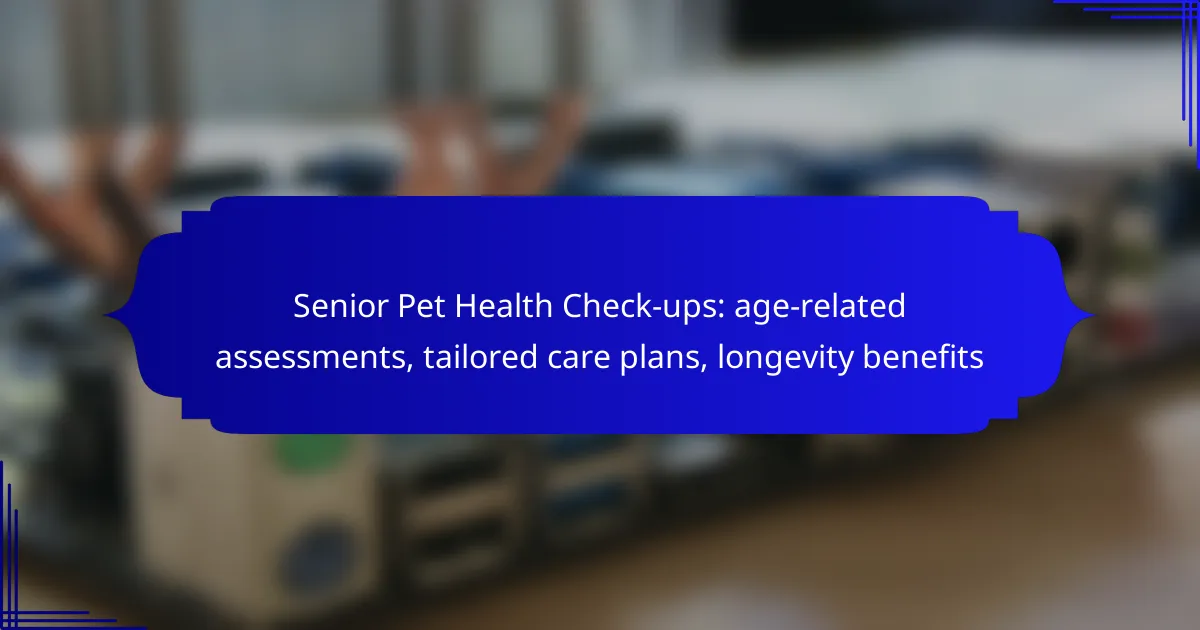Regular health check-ups for senior pets are crucial for ensuring their well-being as they age. These assessments not only facilitate early detection of health issues but also allow for the development of tailored care plans that enhance their quality of life and longevity. By scheduling check-ups at least every six months, pet owners can proactively manage their pets’ health and address any age-related changes promptly.

What are the benefits of senior pet health check-ups in Australia?
Senior pet health check-ups in Australia provide essential benefits, including early detection of health issues, customized care plans, and improved longevity and quality of life. Regular assessments help pet owners proactively manage their pets’ health as they age.
Early detection of health issues
Regular health check-ups for senior pets facilitate the early detection of potential health problems. Conditions such as arthritis, dental disease, and kidney issues can develop gradually, making routine veterinary visits crucial for identifying these concerns before they escalate.
Veterinarians often recommend biannual check-ups for senior pets, which allows for timely interventions. Blood tests, urinalysis, and physical examinations can uncover underlying issues that may not be immediately visible.
Customized care plans
Senior pets often require tailored care plans that address their specific health needs. During check-ups, veterinarians can assess factors such as weight, mobility, and overall health to create a personalized approach to nutrition, exercise, and medication.
These customized plans can include dietary adjustments, supplements, and recommendations for physical activity that suit the pet’s age and condition. This individualized care helps manage chronic conditions and enhances overall well-being.
Improved longevity and quality of life
Regular health check-ups can significantly improve the longevity and quality of life for senior pets. By addressing health issues early and implementing customized care plans, pets can enjoy a more active and comfortable life.
Veterinary guidance on preventive care, such as vaccinations and parasite control, further supports a senior pet’s health. Many pet owners report that their pets remain more energetic and engaged with regular veterinary support, leading to a happier life overall.

How often should senior pets have health check-ups?
Senior pets should have health check-ups at least every six months to monitor age-related health changes. Regular assessments help identify potential issues early, allowing for timely intervention and tailored care plans to enhance their quality of life.
Every six months for pets over seven years
For pets over seven years old, biannual health check-ups are essential. These visits allow veterinarians to conduct thorough examinations, including blood tests and screenings for common age-related conditions such as arthritis, diabetes, and kidney disease.
During these check-ups, pet owners should discuss any behavioral changes, dietary adjustments, or mobility issues. Early detection of health problems can lead to more effective treatment options and better management of chronic conditions.
Annual assessments for younger seniors
Younger senior pets, typically between five and seven years old, should have annual health assessments. These visits are crucial for monitoring their overall health and establishing a baseline for future evaluations.
Routine check-ups can include vaccinations, dental care, and nutritional advice. Keeping a close eye on these pets helps ensure they transition smoothly into their senior years with minimal health complications.

What assessments are included in senior pet health check-ups?
Senior pet health check-ups typically include a range of assessments designed to evaluate the overall health and well-being of aging pets. These assessments help identify potential health issues early, allowing for timely intervention and tailored care plans.
Comprehensive physical examination
A comprehensive physical examination is the cornerstone of senior pet health check-ups. During this assessment, a veterinarian will evaluate the pet’s body condition, mobility, and any visible signs of illness or discomfort. This includes checking the skin, coat, eyes, ears, and heart rate.
Pet owners should be prepared to discuss any behavioral changes or symptoms they have observed, such as weight loss, lethargy, or changes in appetite. This information can help the veterinarian pinpoint areas that require further investigation.
Blood tests for organ function
Blood tests are crucial for assessing organ function in senior pets. Common tests include complete blood counts (CBC) and biochemical panels that evaluate liver, kidney, and thyroid function. These tests can detect underlying issues that may not be apparent during a physical exam.
Veterinarians often recommend conducting these blood tests annually or semi-annually for senior pets. Early detection of abnormalities can lead to more effective treatment options and improved quality of life.
Dental health evaluation
A dental health evaluation is essential for senior pets, as dental disease can lead to serious health complications. During this assessment, the veterinarian will check for signs of gum disease, tooth decay, and other oral health issues. Regular dental cleanings may be recommended based on the evaluation.
Pet owners should maintain a routine dental care regimen at home, including brushing their pet’s teeth and providing dental chews. This proactive approach can help prevent dental problems and promote overall health in senior pets.

How to create a tailored care plan for senior pets?
Creating a tailored care plan for senior pets involves assessing their unique health needs, adjusting their diet, and incorporating suitable exercise routines. This personalized approach helps enhance their quality of life and longevity.
Assess specific health needs
Begin by scheduling a comprehensive veterinary examination to identify any age-related health issues. Common concerns include arthritis, dental disease, and organ function decline. Regular health screenings can help catch problems early, allowing for timely interventions.
Consider factors like breed, size, and pre-existing conditions when assessing health needs. For example, larger breeds may be more prone to joint issues, while smaller breeds might face dental problems. Tailoring the care plan to these specifics can improve overall health outcomes.
Incorporate dietary adjustments
Adjusting your senior pet’s diet is crucial for maintaining their health. Focus on high-quality, nutrient-dense foods that cater to their specific needs, such as lower calories for less active pets or increased fiber for digestive health. Look for formulas designed for senior pets, which often have balanced nutrients.
Consult your veterinarian about portion sizes and feeding frequency. Many senior pets benefit from smaller, more frequent meals to aid digestion and maintain energy levels. Keep an eye on their weight and adjust their diet as needed to prevent obesity.
Include exercise recommendations
Regular exercise is vital for senior pets to maintain mobility and prevent obesity. Tailor the exercise routine to your pet’s abilities, opting for low-impact activities like short walks or gentle play sessions. Aim for at least 20-30 minutes of activity most days of the week.
Monitor your pet during exercise for signs of fatigue or discomfort. Adjust the intensity and duration based on their response, ensuring they remain engaged without overexertion. Incorporating mental stimulation, such as puzzle toys, can also enhance their overall well-being.

What are common age-related health issues in senior pets?
Senior pets often face a variety of age-related health issues that can significantly impact their quality of life. Common concerns include arthritis, dental disease, and kidney disease, each requiring specific attention and care strategies to manage effectively.
Arthritis and mobility issues
Arthritis is a prevalent condition in older pets, leading to joint pain and reduced mobility. Symptoms may include stiffness, difficulty rising, and reluctance to engage in physical activities. Regular veterinary check-ups can help diagnose arthritis early, allowing for timely intervention.
To manage arthritis, consider incorporating joint supplements, weight management, and low-impact exercise into your pet’s routine. Providing a comfortable resting area and using ramps or steps can also help ease mobility challenges.
Dental disease
Dental disease is another common issue in senior pets, often resulting from plaque buildup and gum disease. Signs include bad breath, difficulty eating, and swollen gums. Regular dental cleanings and at-home dental care can prevent severe complications.
To maintain oral health, brush your pet’s teeth regularly and provide dental treats designed to reduce plaque. Consult your veterinarian for professional cleanings and advice tailored to your pet’s needs.
Kidney disease
Kidney disease is a serious condition that affects many older pets, leading to symptoms such as increased thirst, frequent urination, and weight loss. Early detection is crucial, as it can help slow the progression of the disease through dietary changes and medications.
Regular blood tests and urine analysis can help monitor kidney function. Feeding a specialized diet low in protein and phosphorus may also be beneficial. Ensure your pet has constant access to fresh water to support kidney health.

What role does nutrition play in senior pet health?
Nutrition is crucial for senior pet health as it directly impacts their overall well-being, energy levels, and longevity. A well-balanced diet tailored to their age-related needs can help manage health issues and improve quality of life.
Importance of balanced diet
A balanced diet provides essential nutrients that support the unique health requirements of senior pets. As pets age, their metabolism slows, and they may require fewer calories but more specific nutrients, such as protein, fiber, and vitamins.
Proper nutrition can help prevent obesity, which is a common issue in older pets. Maintaining a healthy weight reduces the risk of joint problems, diabetes, and heart disease, enhancing their overall health and longevity.
Specialized senior pet food options
Specialized senior pet foods are formulated to meet the dietary needs of aging pets. These options often include lower calories, higher fiber, and added supplements like glucosamine for joint health. Look for products labeled specifically for senior pets to ensure they contain the right balance of nutrients.
When selecting senior pet food, consider consulting your veterinarian for recommendations based on your pet’s specific health conditions and dietary needs. Regularly reviewing and adjusting their diet can help manage weight and support their health as they age.
